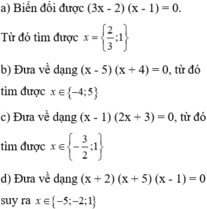Giải các phương trình sau:
a) 2 x 3 x − 2 = 3 x − 1 3 x − 2 ;
b) 2 x − 5 x + 2 = x 2 − 5 x ;
c) x − 1 2 x + 1 + 2 x = 2 ;
d) x + 2 3 − 9 x + 2 = 0 .
Hãy nhập câu hỏi của bạn vào đây, nếu là tài khoản VIP, bạn sẽ được ưu tiên trả lời.



a) \(\sqrt {2{x^2} + x + 3} = 1 - x\)
Bình phương hai vế của phương trình ta được:
\(2{x^2} + x + 3 = 1 - 2x + {x^2}\)
Sau khi thu gọn ta được \({x^2} + 3x + 2 = 0\). Từ đó x=-1 hoặc x=-2
Thay lần lượt hai giá trị này của x vào phương trình đã cho ta thấy cả hai giá trị \(x = - 1;x = - 2\) đều thỏa mãn
Vậy phương trình có tập nghiệm \(S = \left\{ { - 1; - 2} \right\}\)
b) \(\sqrt {3{x^2} - 13x + 14} = x - 3\)
Bình phương hai vế của phương trình ta được:
\(3{x^2} - 13x + 14 = {x^2} - 6x + 9\)
Sau khi thu gọn ta được \(2{x^2} - 7x + 5 = 0\). Từ đó \(x = 1\) hoặc \(x = \frac{5}{2}\)
Thay lần lượt hai giá trị này của x vào phương trình đã cho ta thấy không có giá trị nào của x thỏa mãn
Vậy phương trình vô nghiệm.

Bài 1: Giải các phương trình sau:
a) 3(2,2-0,3x)=2,6 + (0,1x-4)
<=> 6.6 - 0.9x = 2,6 + 0,1x - 4
<=> - 0.9x - 0,1x = -6.6 -1,4
<=> -x = -8
<=> x = 8
Vậy x = 8
b) 3,6 -0,5 (2x+1) = x - 0,25(22-4x)
<=> 3,6 - x - 0,5 = x - 5,5 + x
<=> - x - 3,1 = -5,5
<=> - x = -2.4
<=> x = 2.4
Vậy x = 2.4

a)\(x^3+x^2+x=-\dfrac{1}{3}\)
\(\Leftrightarrow3x^3+3x^2+3x=-1\)
\(\Leftrightarrow\left(x+1\right)^3=-2x^3\)
\(\Leftrightarrow x+1=\sqrt[3]{-2}x\)
\(\Leftrightarrow x=-\dfrac{1}{1+\sqrt[3]{2}}\)
b) \(x^3+2x^2-4x=-\dfrac{8}{3}\)
\(\Leftrightarrow3x^3+6x^2-12x+8=0\)
\(\Leftrightarrow4x^3-\left(x^3-6x^2+12x-8\right)=0\)
\(\Leftrightarrow4x^3=\left(x-2\right)^3\)
\(\Leftrightarrow\sqrt[3]{4}x=x-2\)
\(\Leftrightarrow x=\dfrac{2}{1-\sqrt[3]{4}}\)
Thêm cái icon tặng cho người xong trước, chứ toi đang ức chế vc
Icon ![]() này này,mấy người đánh máy nhanh quá làm toi phải bỏ đi mấy bài :), mà mấy bài dài vc chứ ngắn gì đâu
này này,mấy người đánh máy nhanh quá làm toi phải bỏ đi mấy bài :), mà mấy bài dài vc chứ ngắn gì đâu

a: 3(x-1)+2=2x-1
=>3x-3+2=2x-1
=>3x-1=2x-1
hay x=0
b: (x+1)(x-3)=0
=>x+1=0 hoặc x-3=0
=>x=-1 hoặc x=3
c: \(\Leftrightarrow x\left(x-1\right)-\left(2x-3\right)\left(x+1\right)=x+3\)
\(\Leftrightarrow x^2-x-2x^2-2x+3x+3=x+3\)
\(\Leftrightarrow-x^2-x=0\)
=>x=0(nhận) hoặc x=-1(loại)

a) \(x^2-4x+4=25\\ \Rightarrow\left(x-2\right)^2=25\\ \Rightarrow\left[{}\begin{matrix}x-2=-5\\x-2=5\end{matrix}\right.\\ \Rightarrow\left[{}\begin{matrix}x=-3\\x=7\end{matrix}\right.\)
b) \(\left(5-2x\right)^2-16=0\\ \Rightarrow\left(5-2x\right)^2=16\\ \Rightarrow\left[{}\begin{matrix}5-2x=-4\\5-2x=4\end{matrix}\right.\\ \Rightarrow\left[{}\begin{matrix}x=4,5\\0,5\end{matrix}\right.\)
c) \(\left(x-3\right)^3-\left(x-3\right)\left(x^2+3x+9\right)+9\left(x+1\right)^2=15\\ \Rightarrow\left(x-3\right)^3-\left(x-3\right)^3+9\left(x+1\right)^2=15\\ \Rightarrow9\left(x+1\right)^2=15\\ \Rightarrow\left(x+1\right)^2=\dfrac{5}{3}\\ \Rightarrow\left[{}\begin{matrix}x+1=-\sqrt{\dfrac{5}{3}}\\x+1=\sqrt{\dfrac{5}{3}}\end{matrix}\right.\)
\(\Rightarrow\left[{}\begin{matrix}x=-\dfrac{3+\sqrt{15}}{3}\\x=\dfrac{-3+\sqrt{15}}{3}\end{matrix}\right.\)
a)\(\Leftrightarrow\)\(x^2-4x-21=0\)
\(\Leftrightarrow\)\(x^2-7x+3x-21=0\)
\(\Leftrightarrow\)\(x(x-7)+3(x-7)=0\)
\(\Leftrightarrow\)\((x-7)(x+3)=0\)
\(\Leftrightarrow\)\(\left[\begin{array}{} x=7\\ x=-3 \end{array} \right.\)
b)\(\Leftrightarrow\)\((5-2x)^2-4^2=0\)
\(\Leftrightarrow\)\((5-2x-4)(5-2x+4)=0\)
\(\Leftrightarrow\)\((-2x+1)(-2x+9)=0\)
\(\Leftrightarrow\)\(\left[\begin{array}{} x=\dfrac{1}{2}\\ x=\dfrac{9}{2} \end{array} \right.\)

\(a,3^{x-1}=27\\ \Leftrightarrow3^{x-1}=3^3\\ \Leftrightarrow x-1=3\\ \Leftrightarrow x=4\\ b,100^{2x^2-3}=0,1^{2x^2-18}\\ \Leftrightarrow10^{4x^2-6}=10^{-2x^2+18}\\ \Leftrightarrow4x^2-6=-2x^2+18\\ \Leftrightarrow6x^2=24\\ \Leftrightarrow x^2=4\\ \Leftrightarrow x=\pm2\)
\(c,\sqrt{3}e^{3x}=1\\ \Leftrightarrow e^{3x}=\dfrac{1}{\sqrt{3}}\\ \Leftrightarrow3x=ln\left(\dfrac{1}{\sqrt{3}}\right)\\ \Leftrightarrow x=\dfrac{1}{3}ln\left(\dfrac{1}{\sqrt{3}}\right)\)
\(d,5^x=3^{2x-1}\\ \Leftrightarrow2x-1=log_35^x\\ \Leftrightarrow2x-1-xlog_35=0\\ \Leftrightarrow x\left(2-log_35\right)=1\\ \Leftrightarrow x=\dfrac{1}{2-log_35}\)

a) Ta có: \(\left|x^2-x+2\right|-3x-7=0\)
\(\Leftrightarrow\left|x^2-x+2\right|=3x+7\)
\(\Leftrightarrow x^2-x+2=3x+7\)(Vì \(x^2-x+2>0\forall x\))
\(\Leftrightarrow x^2-x+2-3x-7=0\)
\(\Leftrightarrow x^2-4x-5=0\)
\(\Leftrightarrow x^2-5x+x-5=0\)
\(\Leftrightarrow x\left(x-5\right)+\left(x-5\right)=0\)
\(\Leftrightarrow\left(x-5\right)\left(x+1\right)=0\)
\(\Leftrightarrow\left[{}\begin{matrix}x-5=0\\x+1=0\end{matrix}\right.\Leftrightarrow\left[{}\begin{matrix}x=5\\x=-1\end{matrix}\right.\)
Vậy: S={5;-1}
bạn giải giúp mình câu b nữa với
mai mình phải nộp bài rồi!!!![]()

(a) Điều kiện: \(\left\{{}\begin{matrix}x+1\ge0\\x-5>0\end{matrix}\right.\Leftrightarrow\left\{{}\begin{matrix}x\ge-1\\x>5\end{matrix}\right.\Rightarrow x>5\).
Phương trình tương đương: \(\sqrt{x+1}=2\sqrt{x-5}\)
\(\Leftrightarrow x+1=4\left(x-5\right)\Leftrightarrow x=7\left(TM\right)\).
Vậy: \(S=\left\{7\right\}.\)
(b) Phương trình tương đương: \(x^2-1=8\)
\(\Leftrightarrow x^2=9\Leftrightarrow x=\pm3\).
Vậy: \(S=\left\{\pm3\right\}\)
a: ĐKXĐ: x+1>=0 và x-5>0
=>x>5
\(\dfrac{\sqrt{x+1}}{\sqrt{x-5}}=2\)
=>\(\sqrt{\dfrac{x+1}{x-5}}=2\)
=>\(\dfrac{x+1}{x-5}=4\)
=>4x-20=x+1
=>3x=21
=>x=7
b: ĐKXĐ: \(x\in R\)
\(\sqrt[3]{x^2-1}=2\)
=>x^2-1=8
=>x^2=9
=>x=3 hoặc x=-3

a) \({3^{x + 2}} = \sqrt[3]{9} \Leftrightarrow {3^{x + 2}} = {9^{\frac{1}{3}}} \Leftrightarrow {3^{x + 2}} = {\left( {{3^2}} \right)^{\frac{1}{3}}} \Leftrightarrow {3^{x + 2}} = {3^{\frac{2}{3}}} \Leftrightarrow x + 2 = \frac{2}{3} \Leftrightarrow x = - \frac{4}{3}\)
b) \({2.10^{2{\rm{x}}}} = 30 \Leftrightarrow {10^{2{\rm{x}}}} = 15 \Leftrightarrow 2{\rm{x}} = \log 15 \Leftrightarrow x = \frac{1}{2}\log 15\)
c) \({4^{2{\rm{x}}}} = {8^{2{\rm{x}} - 1}} \Leftrightarrow {\left( {{2^2}} \right)^{2{\rm{x}}}} = {\left( {{2^3}} \right)^{2{\rm{x}} - 1}} \Leftrightarrow {2^{4{\rm{x}}}} = {2^{6{\rm{x}} - 3}} \Leftrightarrow 4{\rm{x}} = 6{\rm{x}} - 3 \Leftrightarrow - 2{\rm{x}} = - 3 \Leftrightarrow x = \frac{3}{2}\).